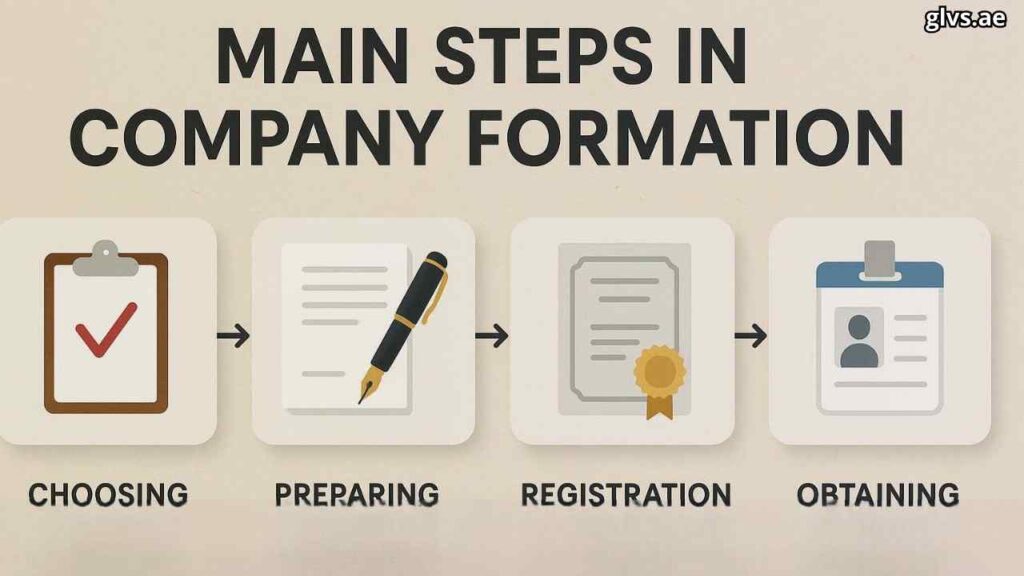Need help? Call us:
+971 56 771 5353

Introduction
Starting a business in the Kingdom of Saudi Arabia (KSA) might sound challenging, but with the right information and planning, it can be a smooth journey. Whether you’re a foreign investor or a local entrepreneur, company formation in Saudi Arabia has become easier due to recent economic reforms and digitalization under Vision 2030. From licensing to legal structure selection, every step must be done carefully to avoid delays or penalties.

Why Choose Saudi Arabia for Business?
Saudi Arabia is transforming rapidly into a global investment hub. The government’s Vision 2030 aims to reduce reliance on oil and attract foreign investors. As a result, company formation in Saudi Arabia is no longer limited to big corporations — SMEs and startups are equally encouraged with incentives and streamlined procedures.
The business environment is favorable due to 100% foreign ownership in many sectors, no personal income tax, and excellent infrastructure. In addition, sectors like tourism, e-commerce, logistics, technology, and renewable energy are booming, making it the perfect time to tap into the Saudi market. Plus, with tools like MISA (Ministry of Investment Saudi Arabia), most procedures are now online and accessible.
Cost Breakdown of Company Formation in Saudi Arabia
Setting up a company in KSA includes both official fees and operational costs. On average, the total cost for company formation in Saudi Arabia ranges between SAR 10,000 to SAR 50,000 depending on the type of company, business activity, and service providers. Here’s what the cost generally includes:
- MISA License Fee: For foreign investors, this is a mandatory step. The fee varies depending on the license type but typically ranges from SAR 2,000 to SAR 11,000.
- Commercial Registration (CR): Issued by the Ministry of Commerce, this costs around SAR 1,200–2,000 annually.
- Chamber of Commerce Membership: Required for CR activation; fees start at SAR 800 annually.
- ZATCA Registration & VAT Setup: Essential for taxation and invoicing; costs may include professional consultancy if outsourced.
- Office Lease or Virtual Office Setup: Must provide a physical address; rent for virtual offices can range between SAR 5,000–15,000 per year.
These are just initial expenses. You’ll also have to consider legal translation, notarization of documents, and possible professional fees if you hire a consultant.

Main Steps in Company Formation
Here’s a step-by-step breakdown in bullet format for easier understanding:
- Obtain MISA Investment License: If you’re a foreign investor, the first step is to apply for a license from MISA. You’ll need to submit business plans, IDs, and parent company documents (if applicable). This can take 2–4 weeks.
- Reserve Company Name: Through the Ministry of Commerce online portal, reserve a unique Arabic name that aligns with your business activity. This process is simple and usually completed within a day.
- Draft Articles of Association (AOA): You’ll need to prepare and notarize your company’s AOA in Arabic. This document outlines your company’s structure, capital, and shareholders’ roles.
- Issue Commercial Registration (CR): Once the AOA is notarized and your trade name is reserved, you can apply for a CR. This officially registers your business in Saudi Arabia and allows you to legally operate.
- Register for Taxes and Open a Bank Account: After getting the CR, register with ZATCA (tax authority), apply for VAT if applicable, and open a Saudi corporate bank account using your CR and other official papers.
Key Factors to Consider Before Registering Your Company
Before jumping into registration, consider the legal structure of your business. Common forms include Limited Liability Company (LLC), Branch Office, Joint Stock Company (JSC), or Sole Proprietorship. Your choice affects your tax structure, liability, and ownership rights. For example, foreign companies usually choose LLC or Branch Office structures due to flexibility.
Also, consider sponsorship requirements — while many sectors now allow 100% foreign ownership, some activities still require a local partner. Make sure to verify your chosen activity in the Saudi Nitaqat system to understand Saudization requirements (the number of local employees needed). Last but not least, hire a reliable legal or business consultant, especially if you’re setting up remotely.

Things to Watch Out For
To make your process smooth, here are some crucial factors to keep in mind:
- Type of Business Activity: Not all sectors allow full foreign ownership. Activities related to real estate, recruitment, or security often need a local partner or extra approval.
- Saudization Compliance: Companies must hire a minimum number of Saudi nationals based on their category. Non-compliance can result in fines or license suspension.
- Location & Office Requirements: Every business needs a registered address. In some cases, virtual offices work, but others need physical presence especially for retail or industrial businesses.
- Ongoing Costs & Renewals: Licenses, CR, Chamber membership — all need yearly renewals. Budget for these ongoing compliance expenses.
- Bank Account Challenges: Opening a bank account can be tricky for new businesses. Some banks have strict KYC (Know Your Customer) policies, so it may take a few weeks to complete.
Also Read: Master Profit Forte Tax Consultancy Today 2025
Conclusion
Company formation in Saudi Arabia has become more accessible than ever, especially for foreign investors. With proper planning, clear documentation, and the right guidance, you can have your business up and running in a few weeks. The country offers unmatched growth opportunities in a business-friendly ecosystem — just make sure to follow all regulatory steps and stay updated with changing policies.
Whether you’re setting up a startup or a corporate branch, success in the Kingdom begins with clarity, compliance, and local understanding. So if you’re looking to expand into the Gulf market, Saudi Arabia might just be the perfect launchpad.
FAQ About Company Formation in Saudi Arabia
Q1: How much does it cost to set up a company in Saudi Arabia?
Ans: Costs vary by business type but generally range from SAR 10,000 to SAR 50,000, excluding license, visa, and office setup fees.
Q2: Can a foreigner start a company in Saudi Arabia?
Ans: Yes, foreigners can start a business with proper licenses, a local office, and approval from the Ministry of Investment (MISA).
Q3: How to start a company in Saudi Arabia?
Ans: Start by getting an investment license from MISA, then register with the Ministry of Commerce and set up a local office.
Q4: How to register a company in Saudi Arabia from Pakistan?
Ans: You can apply through MISA’s online portal, hire a local agent, and provide required documents including a business plan and passport copies.
Q5: How long does it take to register a company in Saudi Arabia?
Ans: The process usually takes 2 to 6 weeks depending on documentation, approvals, and business activity type.
Q6: How to establish a company in Saudi Arabia?
Ans: Obtain an investment license, register the business name, sign Articles of Association, and complete local office and labor setup.
Q7: How much does it cost to register a company in Saudi Arabia?
Ans: Registration fees start around SAR 2,000–3,000, but full setup costs including legal, visa, and office expenses may exceed SAR 20,000.
Q8: Is it possible to change company in Saudi Arabia?
Ans: Yes, with proper approval and after completing contractual obligations, employees can transfer sponsorship to another company.